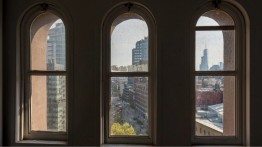Student Financial Services

View from Peter Cooper Suite
Honoring Peter Cooper’s belief that education should be accessible to all, our mission is to ensure that no student is deterred from attending The Cooper Union based on their financial circumstances.
- We meet 100% of demonstrated and determined financial need
- Every admitted undergraduate student receives a half-tuition scholarship valued at $22,275 per year, as well as need- and merit-based aid if eligible
- Our plan is to be 100% tuition-free by the 2028-2029 academic year
- For the eighth consecutive year, we are not raising undergraduate tuition
- 2024 - 2025 academic year aid for our full-time undergraduate students included:
- 100% of tuition is covered by scholarship or grant aid for 58% of students
- 92% of tuition is the average scholarship amount or grant aid received
- 100% of students receive a minimum of a 50% scholarship or grant aid
- 30% of our students are Pell Grant recipients
The Master of Science in Architecture program offers a merit scholarship valued at approximately 25% of the base tuition.
The Cooper Union is recognized as one of the most affordable colleges in the country, receiving top rankings in US News, Money, and The Princeton Review.
Learn more about Cooper's affordability:
- Use our Net Price Calculator to help determine your eligibility for aid
- Compare Cooper with other schools on the College Scorecard
- Email us at financialaid@cooper.edu with questions
- Schedule a virtual appointment or an in-person appointment (you must have a cooper.edu email address to use the calendars)
- Download our affordability and financial aid one-sheeter
- Apply and file your Free Application for Federal Student Aid (FAFSA), The Cooper Union code is 002710
- IMPORTANT: FAFSA School Name Discrepancy
Please be advised that the Federal FAFSA system is currently displaying an incorrect name for our institution. When entering our school code, you may see the name “Senior Director of Student Financial Ser.”
002710 is the correct code for our school. Please proceed with your submission using this name. Your information will transmit to us securely and correctly. We have already received over 1,000 applications successfully and are working with the Department of Education to update the name.




